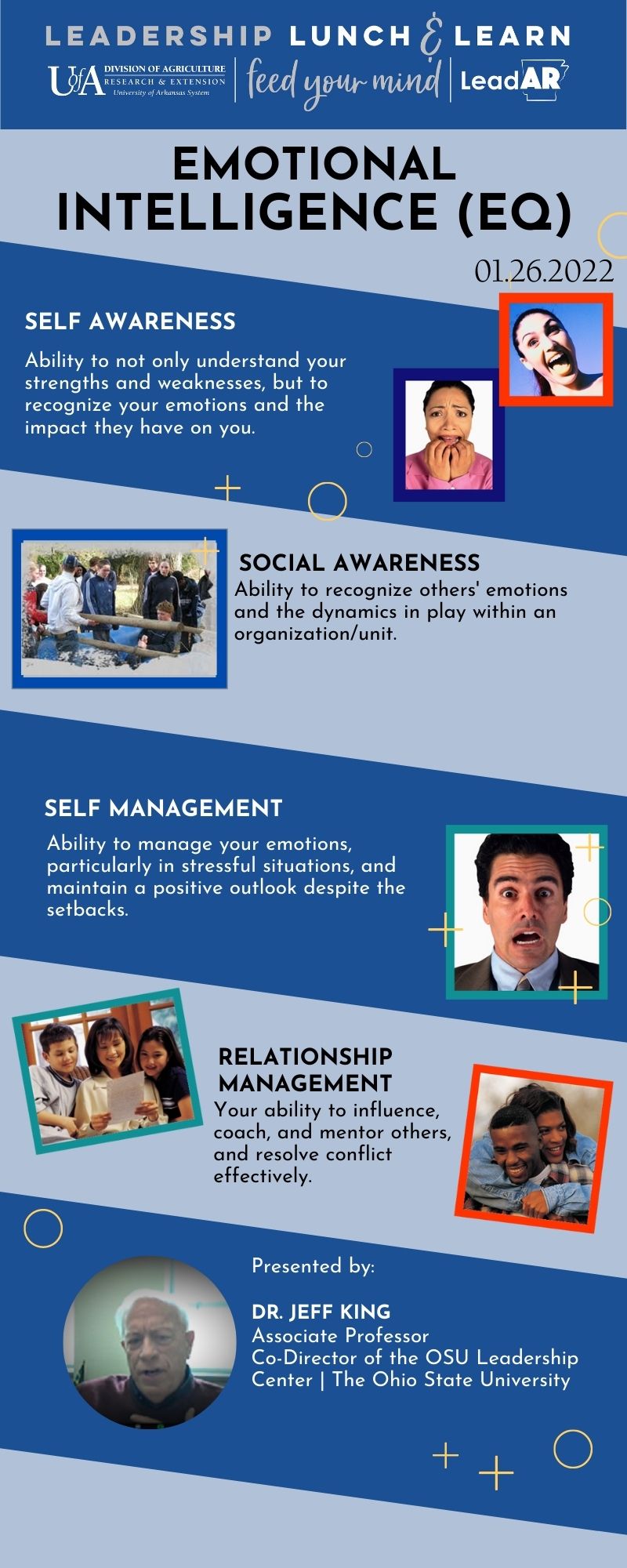January
Contact
Lisa Davis
Program Associate-Leadership
Phone: 501-519-5472
Email: ldavis@uada.edu
University of Arkansas System Division of Agriculture
Cooperative Extension Service
2301 S. University Avenue
Little Rock, AR 72204
Most People Think They Are Self-Aware but Only 10 to 15 Percent of People Actually Are
What is emotional intelligence? Dr. Jeff King, associate professor and co-chair of
The Ohio State University Leadership Center, shared his insights on the topic in the
January Leadership Lunch and Learn session.
“Emotional intelligence is a set of emotional and social skills that influence the way we perceive and express ourselves, develop and maintain social relationships, cope with challenges, and use emotional information in an effective and meaningful way,” King said, citing Multi-Health Systems, Inc.
King said one could equate the term to “emotional and social effectiveness.”
The four categories of emotional intelligence include: self-awareness, social awareness, self-management, and relationship management — understanding each of these can help people build positive relationships, develop cooperative connections, and reduce emotional reactivity.
Self-Awareness
If people are self-aware, they can see their own patterns of behaviors and motives. They know how their emotions and actions impact those around them, for better or for worse. They can name their own emotions when they come up and understand why they’re there. They can also recognize triggers, identify their strengths, and own limitations.
King shared this statistic, “95 percent of people think they’re aware, but only 10-15 percent actually are.” (Eurich, 2018)
Social Awareness
Social awareness is the ability to accurately pick up on the emotions of other people and understand what is really going on with them. It involves the ability to empathize what others are feeling and why. To successfully be socially aware, a person must listen and stop talking or waiting to talk. King suggested that we must keep in mind that understanding what the other person is saying does not mean agreeing with them.
Self-Management
If someone can self-manage, their emotional reactions are in proportion to the given circumstances. They know how to pause as needed and control their impulses. They think before they act and consider the consequences. It also means they know how to ease tension, manage conflict, cope with difficult scenarios, and adapt to changes in their environment.
Relationship Management
Relationship management is the ability to build value-adding relationships with others. It includes the identification, analysis, and management of relationships with people inside and outside of a team as well as their development through feedback and coaching. It also incorporates one’s ability to communicate, persuade, and lead others, whilst being direct and honest without alienating people.
Strategies to Improve Emotional and Social Effectiveness
King asked participants to think about a recent encounter or decision they made that involved emotions and asked them to walk through the four emotional intelligence categories. He offered these tips:
- Understand role of emotions — Let the emotion inform rather than the emotion drive the approach.
- Think about why you feel the way you do and evaluate how that should inform your decision.
- Try seeing the situation accurately and knowing when the emotion is impacting objectivity.
- Use self-control to allow the processing of information.
View the recorded session here.
The next session in the Leadership Lunch and Learn series will take place 12:15-1 p.m., Feb. 23, on “Conflict Resolution.”